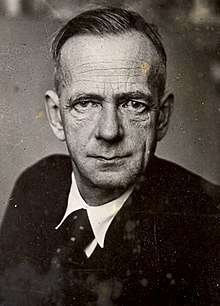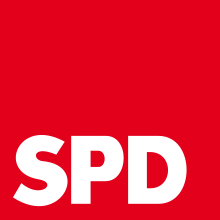Kurt Schumacher
Kurt Ernst Carl Schumacher (13 October 1895 – 20 August 1952) was a German social democratic politician, who served as chairman of the Social Democratic Party of Germany from 1946 and was the first Leader of the Opposition in the West German Bundestag from 1949 until his death in 1952. An opponent of Chancellor Konrad Adenauer's government, but an even stronger opponent of the East German Socialist Unity Party and communism in general, he was one of the founding fathers of post-war German democracy. He was also a noted opponent of the far-right and the far-left, i.e. the Nazi Party and the Communist Party of Germany, during the Weimar Republic, and is famous for his description of the communists as "red-painted Nazis."[2].
Kurt Schumacher | |
|---|---|
 Schumacher between 1945 and 1948 | |
| Leader of the Social Democratic Party | |
| In office 10 May 1946 – 20 August 1952 | |
| Preceded by | Hans Vogel |
| Succeeded by | Erich Ollenhauer |
| Personal details | |
| Born | Curt Ernst Carl Schumacher[1] 13 October 1895 Kulm, West Prussia, German Empire |
| Died | 20 August 1952 (aged 56) Bonn, West Germany |
| Political party | Social Democratic Party of Germany |
| Occupation | Jurist |
Early career
.jpg)
Kurt Schumacher was born in Kulm in West Prussia (now Chełmno in Poland), the son of a small businessman, member of the liberal German Free-minded Party and deputy in the municipal assembly. The young man was a brilliant student, but when the First World War broke out in 1914 he immediately abandoned his studies and joined the German Army. In December, at Bielawy west of Łowicz in Poland, he was so badly wounded that his right arm had to be amputated.[3] After contracting dysentery, he was finally discharged from the army and was decorated with the Iron Cross 2nd class. He returned to his law and politics studies in Halle, Leipzig and Berlin, where he graduated in 1919.[3]
Inspired by Eduard Bernstein, Schumacher became a dedicated socialist and in 1918 joined the Social Democratic Party (SPD) leading ex-servicemen in forming Workers and Soldiers Councils in Berlin during the revolutionary days following the fall of the German monarchy. He opposed various attempts by Communist groups to seize power. In 1920 the SPD sent him to Stuttgart to edit the party newspaper there, the Schwäbische Tagwacht.
Schumacher was elected to the Württemberg Landtag (state legislature) in 1924 and in 1928 became the SPD leader in the state. When the Nazis rose to prominence, Schumacher helped organise socialist militias to oppose them. In 1930 he was elected to the national legislature, the Reichstag.[3] In August 1932 he was elected to the SPD leadership group; at age 38 he was youngest SPD member of the legislature.
Under the Nazis
Schumacher was staunchly anti-Nazi. In a Reichstag speech on 23 February 1932, he excoriated Nazism as "a continuous appeal to the inner swine in human beings" and stated the movement had been uniquely successful in "ceaselessly mobilizing human stupidity."[4] Schumacher was arrested in July 1933, two weeks before the SPD was banned. He was severely beaten in prison. He spent the next ten years in concentration camps at Heuberg, Kuhberg, Flossenbürg and Dachau.[3] The camp at Dachau was intended for people whom the Nazis wanted to keep alive, and the fact that he was a disabled ex-service man gained Schumacher some leniency.
In 1943, when Schumacher was near death, his brother-in-law succeeded in persuading a Nazi official to have him released into his custody. He was arrested again in late 1944, and he was in Neuengamme concentration camp when the British arrived in April 1945.[3]
Postwar politics
Schumacher wanted to lead the SPD and bring Germany to socialism. By May, he was already reorganising the SPD in Hanover, without the permission of the occupation authorities. He soon found himself in a battle with Otto Grotewohl, the leader of the SPD in the Soviet Zone of Occupation, who was arguing that the SPD should merge with the Communists to form a united socialist party. Schumacher rejected Grotewohl's proposal. In August, he called an SPD convention in Hanover, which elected him as the "Western leader" of the party.
In January 1946, the British and Americans allowed the SPD to reform itself as a national party, with Schumacher as leader. As the only SPD leader who had spent the whole Nazi period in Germany without collaborating, he had enormous prestige. He was certain that his right to lead Germany would be recognised by both the Allies and the German electorate.
However, Schumacher met his match in Konrad Adenauer, the former mayor of Cologne, whom the Americans, not wanting to see socialism of any kind in Germany, were grooming for leadership. Adenauer united most of the pre-war German conservatives into a new party, the Christian Democratic Union (CDU). Schumacher campaigned through 1948 and 1949 for a united socialist Germany, and particularly for the nationalisation of heavy industry, whose owners he blamed for funding the Nazis' rise to power. When the occupying powers opposed his ideas, he denounced them. Adenauer opposed socialism on principle, and also argued that the quickest way to get the Allies to restore self-government to Germany was to co-operate with them.
Schumacher wanted a new constitution with a strong national presidency, confident that he would occupy that post. However, the first draft of the 1949 Grundgesetz provided for a federal system with a weak national government, as favoured both by the Allies and the CDU. Schumacher refused to give way on this, and eventually the Allies, keen to get the new German state functioning in the face of the Soviet challenge, conceded some of what Schumacher wanted. The new federal government would be dominant over the states, although the president would have limited powers.

Schumacher versus Adenauer
The Federal Republic's first national elections were held in August 1949. Schumacher was convinced he would win, and most observers agreed with him. But Adenauer's new CDU had several advantages over the SPD. Much of the SPD's prewar power base was now part of the Soviet Zone, while the most conservative parts of prewar Germany, such as Bavaria and the Rhineland, were in the new Federal Republic of Germany. In addition both the American and French occupying powers favoured Adenauer and did all they could to assist his campaign; the British remained neutral.
Further, the onset of the Cold War, and particularly the behaviour of the Soviets and the German Communists in the Soviet Zone, produced an anti-socialist reaction in Germany as elsewhere. While the SPD would very plausibly have won an election in 1945, the tide had turned against them by 1949. This came even as the SPD became increasingly critical of the new East German government. Schumacher was especially critical, once labelling the Communists "red-painted fascists". Schumacher attempted to heavily distinguish in the public consciousness between his vision of "democratic socialism" and the realities in East Germany but nevertheless, found his party partially damned by association.[5]
Another factor was the recovery of the German economy, thanks mainly to the currency reform of the CDU's Ludwig Erhard. Matters were further complicated by Schumacher's declining health; for example, in September 1948 he had one of his legs amputated.[6] Germans admired Schumacher's courage, but they doubted that he could carry out the duties of federal Chancellor.
Although Schumacher's SPD won the most seats of any single party in the election (though the CDU and its sister party, the CSU, together won more seats), the CDU was able to form a centre-right coalition government with the Free Democratic Party, the Christian Social Union, and the German Party, and Adenauer was elected Chancellor. This was a shock to Schumacher. He refused to co-operate in parliamentary matters and denounced the CDU as agents of the capitalists and foreign powers.
Schumacher opposed the emerging new organisations of European co-operation, the Council of Europe, the European Coal and Steel Community and the European Defence Community, which he saw as devices for strengthening capitalism, and for extending Allied control over Germany. This stand aroused the opposition of the other west European socialist parties, and eventually the SPD over-ruled him and sent delegates to the Council of Europe.
During the remainder of Adenauer's first term in office, Schumacher continued to oppose his government, but the rapid rise in German prosperity, the intensification of the Cold War and Adenauer's increasing success in getting Germany accepted in the international community all worked to undermine Schumacher's position. The SPD began to have serious doubts about going into another election with Schumacher as leader, particularly when he had a stroke in December 1951.[7] They were spared having to deal with this dilemma when Schumacher died suddenly in August 1952.[8]
Adenauer admired Schumacher's integrity, willpower and courage, even while opposing his policies, and was shocked at his death. "Despite our differences", he said, "we were united in a common goal, to do everything possible for the benefit and well-being of our people."
References
- "Schumacher, Kurt" (in German). Deutsche Biographie. Retrieved 8 July 2020.
- Schmeitzner, Mike (2007). Totalitarismuskritik von links deutsche Diskurse im 20. Jahrhundert. Vandenhoeck & Ruprecht. p. 255. ISBN 978-3-525-36910-4.
- Spell, Hartmut (2012). "Für ein neues Deutschland" [For a new Germany]. Damals (in German). Vol. 44 no. 8. pp. 10–13.
- Judt, p. 268
- Plener, Ulla (2002). "Kurt Schumacher 1949–1952 - Die innere Gestaltung der BRD im Schatten seines Antikommunismus". Jahrbuch für Forschungen zur Geschichte der Arbeiterbewegung (3).
- "Vor 60 Jahren: Todestag von Kurt Schumacher" (in German). Deutscher Bundestag. 20 August 2012. Retrieved 8 July 2020.
- Augstein, Rudolf (25 April 1988). "„Der Mann mit dem leeren, flatternden Ärmel"" (in German). Der Spiegel. Retrieved 8 July 2020.
- "Kurt Schumacher, 56, Dies in Bonn; Headed Opposition to Adenauer; Leader of German Socialists Was Foe of Nazis -- Put Unity Above Ties to West". The New York Times. 21 August 1952. Retrieved 8 July 2020.
Sources
- Judt, Tony (2006). Postwar A History of Europe Since 1945. Penguin. ISBN 978-0-14-303775-0.
- Plener, Ulla (2002). "Kurt Schumacher 1949–1952 - Die innere Gestaltung der BRD im Schatten seines Antikommunismus". Jahrbuch für Forschungen zur Geschichte der Arbeiterbewegung (3).
Further reading
- Maxwell, John Allen. "Social Democracy in a Divided Germany: Kurt Schumacher and the German Question, 1945-1952." Unpublished Ph.D dissertation, West Virginia University, Department of History, Morgantown, West Virginia, 1969.
External links
| Party political offices | ||
|---|---|---|
| Preceded by Hans Vogel |
Chairman of the Social Democratic Party of Germany 1946–1952 |
Succeeded by Erich Ollenhauer |
